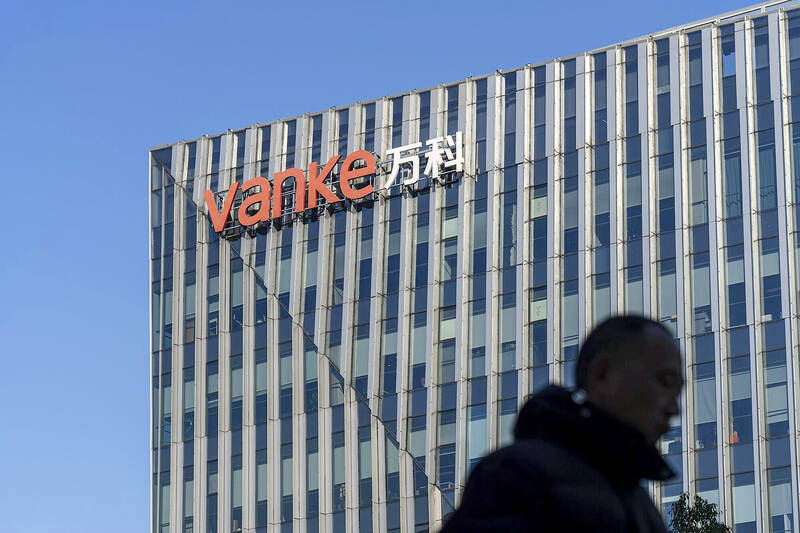China Vanke Co (萬科) rebounded from record lows in credit markets, as people familiar with the matter said the distressed developer had previously told some creditors it had enough cash prepared to repay a local note.
The firm told some creditors prior to turbulence in its bonds and shares yesterday that it had prepared enough cash to repay a 3 billion yuan (US$409.3 million) bond due on Jan. 27, the people said.
Uncertainty continued to swirl about the whereabouts of the company’s top executive following an earlier local news report that the property developer might be seized by state authorities.

Photo: Bloomberg
The builder’s bonds erased losses in the afternoon in Hong Kong, with its US dollar note due in May jumping US$0.066 to US$0.665 and its securities due 2027 rising about US$0.04 from record lows earlier in the day. Trading in three local bonds was halted after prices surged about 20 percent. The company’s shares were down 4.5 percent, paring losses after earlier tumbling as much as 9 percent in Hong Kong to the lowest since September last year.
Vanke CEO Zhu Jiusheng earlier answered a call from a Cailian reporter, several hours after the Economic Observer reported he had been taken away by police. The report was later deleted from the Chinese newspaper’s Web site. Further fueling uncertainty, Zhu promoted Vanke’s rental apartment business in a post on WeChat early yesterday.
Distress has deepened in recent weeks at the builder, a household name in China that had long been seen as more insulated from property crises, because of its state backing through its largest shareholder, Shenzhen Metro Group Co (深圳市地鐵集團). Vanke’s long-term corporate family rating was downgraded deeper into junk territory earlier in the day to B3 from B1 at Moody’s.
Vanke has been in the spotlight since the start of the year, as it faces a wall of debt repayments. The company’s home sales have been tanking, despite a flurry of support for the property market last year. The firm was once seen as too big to fail. However, Beijing has yet to signal its stance toward the property giant as the property crisis enters its fifth year after sparking record defaults.
The Economic Observer also reported that a task force sent by the local government of Shenzhen — where the developer is based — had stepped in to run the company and that Vanke might be taken over or restructured. The article also was later deleted from the newspaper’s Web site.
“China Vanke’s possible state takeover — including its CEO’s detention, as reported by the Economic Observer — signals new urgency in a drawn-out and costly property crisis that has shaken the country’s economy,” Bloomberg Intelligence analyst Kristy Hung said.
“Up next could be a management shake-up and a push to protect homeowners over bondholders, with a bailout and cash injection both less likely,” Hung said.
Vanke did not immediately offer comments when contacted by Bloomberg News.
The developer has US$4.9 billion in yuan and US dollar-denominated bonds maturing or facing redemption options this year, its highest annual amount ever, and the most for any Chinese developer this year, Bloomberg data showed. Trading in the company’s yuan bond maturing in November 2027 was halted after it plunged 32 percent, following similar actions on other securities in recent days.
Vanke has said it would make all efforts to deal with its public debt obligations this year.

Intel Corp chief executive officer Lip-Bu Tan (陳立武) is expected to meet with Taiwanese suppliers next month in conjunction with the opening of the Computex Taipei trade show, supply chain sources said on Monday. The visit, the first for Tan to Taiwan since assuming his new post last month, would be aimed at enhancing Intel’s ties with suppliers in Taiwan as he attempts to help turn around the struggling US chipmaker, the sources said. Tan is to hold a banquet to celebrate Intel’s 40-year presence in Taiwan before Computex opens on May 20 and invite dozens of Taiwanese suppliers to exchange views

Application-specific integrated circuit designer Faraday Technology Corp (智原) yesterday said that although revenue this quarter would decline 30 percent from last quarter, it retained its full-year forecast of revenue growth of 100 percent. The company attributed the quarterly drop to a slowdown in customers’ production of chips using Faraday’s advanced packaging technology. The company is still confident about its revenue growth this year, given its strong “design-win” — or the projects it won to help customers design their chips, Faraday president Steve Wang (王國雍) told an online earnings conference. “The design-win this year is better than we expected. We believe we will win

Chizuko Kimura has become the first female sushi chef in the world to win a Michelin star, fulfilling a promise she made to her dying husband to continue his legacy. The 54-year-old Japanese chef regained the Michelin star her late husband, Shunei Kimura, won three years ago for their Sushi Shunei restaurant in Paris. For Shunei Kimura, the star was a dream come true. However, the joy was short-lived. He died from cancer just three months later in June 2022. He was 65. The following year, the restaurant in the heart of Montmartre lost its star rating. Chizuko Kimura insisted that the new star is still down

While China’s leaders use their economic and political might to fight US President Donald Trump’s trade war “to the end,” its army of social media soldiers are embarking on a more humorous campaign online. Trump’s tariff blitz has seen Washington and Beijing impose eye-watering duties on imports from the other, fanning a standoff between the economic superpowers that has sparked global recession fears and sent markets into a tailspin. Trump says his policy is a response to years of being “ripped off” by other countries and aims to bring manufacturing to the US, forcing companies to employ US workers. However, China’s online warriors